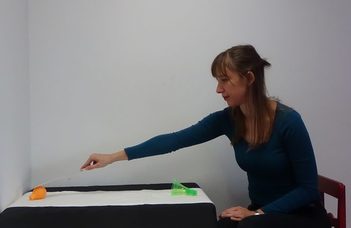Let's think about what happened last time - Memory development in children aged 2 years

In this study, we investigated the memory development of children aged two and three. Do they remember what is important for achieving their goals, or do they remember details that were not really relevant in the situation?
To answer our question, firstly, we tested two-year-old children on two occasions with a one-week delay. On the first occasion, an experimenter showed the children how to build toys (horn, propeller, and bullet) from two parts. However, there was an unnecessary step in the process: The second element of the toy was close to the experimenter, but she used a kitchen to pull it to herself. After the demonstration, the experimenter encouraged the children to play with the toys. 67% of children didn’t use the kitchen spoon to reach the toy, and 22% of the children used it only once. Thus they realized that using the spoon was unnecessary to achieve the goal. On the second occasion, the situation was different: children could only reach the toys with the kitchen spoon. Children had to remember the first occasion to solve the task because no one demonstrated the solution to them. Half of the children (56%) used the spoon to reach the toy. Probably, the others forgot how to use the spoon to achieve the goal. The results suggest that children at this age do not remember events ("what happened") but goal-directed actions and scenarios ("how to do it").
We also tested three-year-old children. They didn't imitate the experimenter when the spoon was unnecessary and reached for the toy with their hands. However, on the second occasion, they recalled that the spoon was necessary to solve the task. These results suggest that between the ages of 3 and 4, children's remembering becomes more flexible to recall details that were not relevant before.
